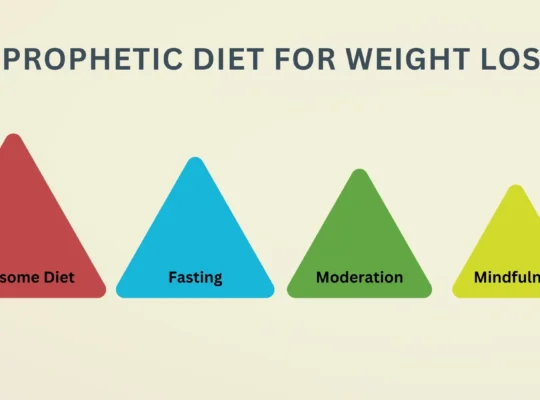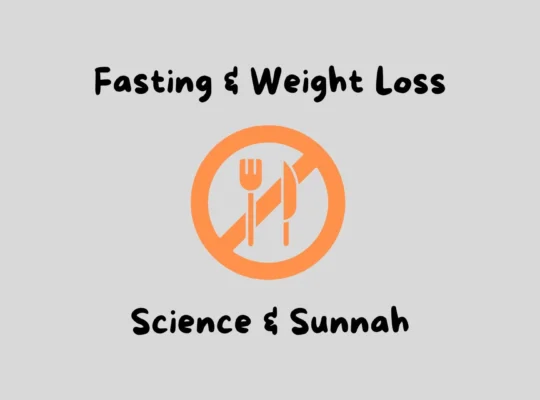Introduction
Fasting has been an integral part of Islamic teachings for over 1400 years, offering immense spiritual, mental, and physical benefits. In recent years, Intermittent Fasting (IF) has gained global attention so has the “concept of intermittent fasting in Islam”. Surprisingly, many of its principles align closely with Islamic fasting practices such as Ramadan fasting, Sunnah fasting (Mondays & Thursdays), and Ayyam al-Bid (White Days Fasting).
But how does Intermittent Fasting connect with Islamic teachings? Is there scientific evidence that supports what Islam has already prescribed? Let’s explore the concept of intermittent fasting in Islam and striking similarities between these two practices and understand why fasting is a Sunnah that promotes both spiritual and physical well-being.

Understanding the Concept of Intermittent Fasting in Islam
Intermittent Fasting (IF) is an eating pattern that involves alternating periods of fasting and eating. Unlike traditional diets, IF does not focus on what to eat but rather when to eat.
There are several types of Intermittent Fasting, but the most common ones include:
✅ 16:8 Method – Fasting for 16 hours and eating within an 8-hour window.
✅ 5:2 Diet – Eating normally for 5 days and restricting calorie intake for 2 non-consecutive days in a week.
✅ Alternate-Day Fasting – Fasting every other day, consuming little to no calories on fasting days.
✅ Eat-Stop-Eat – Fasting for 24 hours once or twice a week.
Islamic fasting, particularly Sunnah fasting (Monday & Thursday) and Ramadan fasting, closely resemble these fasting styles.
Islamic Fasting and Intermittent Fasting: Key Similarities
1. The Sunnah of Delayed Eating (Time-Restricted Eating)
Islamic fasting follows a natural time-restricted eating pattern, similar to the 16:8 Intermittent Fasting method.
👉 The Prophet Muhammad (ﷺ) emphasized delaying the morning meal (Suhoor) until shortly before Fajr and breaking the fast at Maghrib, creating a long fasting window.
✅ Hadith Evidence:
“Eat Suhoor, for in Suhoor there is blessing.” (Sahih al-Bukhari 1923, Muslim 1095)
This Sunnah naturally aligns with modern Intermittent Fasting, which promotes prolonged fasting hours for better metabolism, insulin control, and fat loss.
2. Fasting for Spiritual & Physical Benefits
Islam prescribes fasting not just for spiritual purification but also for physical detoxification. This aligns with the modern understanding of Intermittent Fasting’s benefits, which include:
✅ Fat Burning & Weight Loss – Fasting helps reduce insulin levels, making the body switch to fat as an energy source.
✅ Cellular Repair & Detoxification – The process of autophagy (natural body cleansing) is activated during fasting.
✅ Reduced Inflammation & Disease Prevention – Fasting lowers risks of heart disease, diabetes, and obesity.
✅ Quranic Evidence:
“And fast, it is better for you if you only knew.” (Surah Al-Baqarah 2:184)
Science now supports what Islam prescribed centuries ago – fasting is indeed better for us in ways we are still discovering.
3. The Prophetic Way of Eating: Moderation & Simplicity
One of the core teachings of Islam is moderation in eating, which is also a key aspect of Intermittent Fasting.
✅ The Prophet Muhammad (ﷺ) warned against overeating:
“The son of Adam does not fill any vessel worse than his stomach. It is sufficient for the son of Adam to eat that which will support his back.” (Ibn Majah 3349)
Islamic fasting naturally restricts excessive calorie intake and trains the body to eat mindfully, preventing obesity and metabolic diseases.
4. Sunnah Fasting (Monday & Thursday) and the 5:2 Diet
The Prophet (ﷺ) encouraged fasting on Mondays and Thursdays, which resembles the modern 5:2 Intermittent Fasting method (eating normally 5 days and restricting 2 days).
✅ Hadith Evidence:
“Deeds are presented on Monday and Thursday, and I like my deeds to be presented while I am fasting.” (Tirmidhi 747)
Modern research shows that fasting twice a week leads to:
✔ Lower cholesterol & blood pressure
✔ Reduced insulin resistance
✔ Effective weight management
Following the Sunnah of fasting is not just rewarding spiritually but also scientifically proven to enhance health.
5. Fasting as a Means of Self-Discipline
Both Islamic fasting and Intermittent Fasting instill self-control over food, habits, and desires.
✅ Prophet Muhammad (ﷺ) said:
“O young men! Those among you who can support a wife should marry, and those who cannot should fast, for it will be a shield for him.” (Sahih al-Bukhari 5065)
Fasting helps regulate appetite hormones, prevent overeating, and enhance mental clarity, making it a tool for both spiritual and physical discipline.
Scientific Benefits of Fasting in Light of Islam
Recent studies confirm that Intermittent Fasting offers numerous health benefits, many of which align with Islamic wisdom:
📌 Weight Loss & Fat Reduction – Fasting helps in burning visceral fat, reducing obesity risks.
📌 Lower Risk of Type 2 Diabetes – It improves insulin sensitivity and regulates blood sugar.
📌 Improved Brain Function – Fasting enhances mental focus, reducing stress and depression.
📌 Longevity & Anti-Aging – Studies suggest fasting slows down aging and promotes a longer life.
✅ Hadith Evidence:
“Fast so that you may stay healthy.” (Ibn Majah 3443)
This Prophetic advice is now supported by scientific research, proving that fasting is one of the best health practices.
Final Words: Intermittent Fasting is Already in Islam
Intermittent Fasting may seem like a new health trend, but it has been a Sunnah practice for over 1400 years.
✔ Islamic fasting and Intermittent Fasting share similar health benefits, from weight loss and metabolism boost to mental clarity and self-discipline.
✔ The Sunnah fasting (Monday & Thursday, Ayyam al-Bid) closely resembles modern fasting methods.
✔ Fasting is not just about abstaining from food – it’s a holistic practice that nourishes both body and soul.
Read: The Concept of Health in Sunnah: A Holistic Approach to Well-Being







